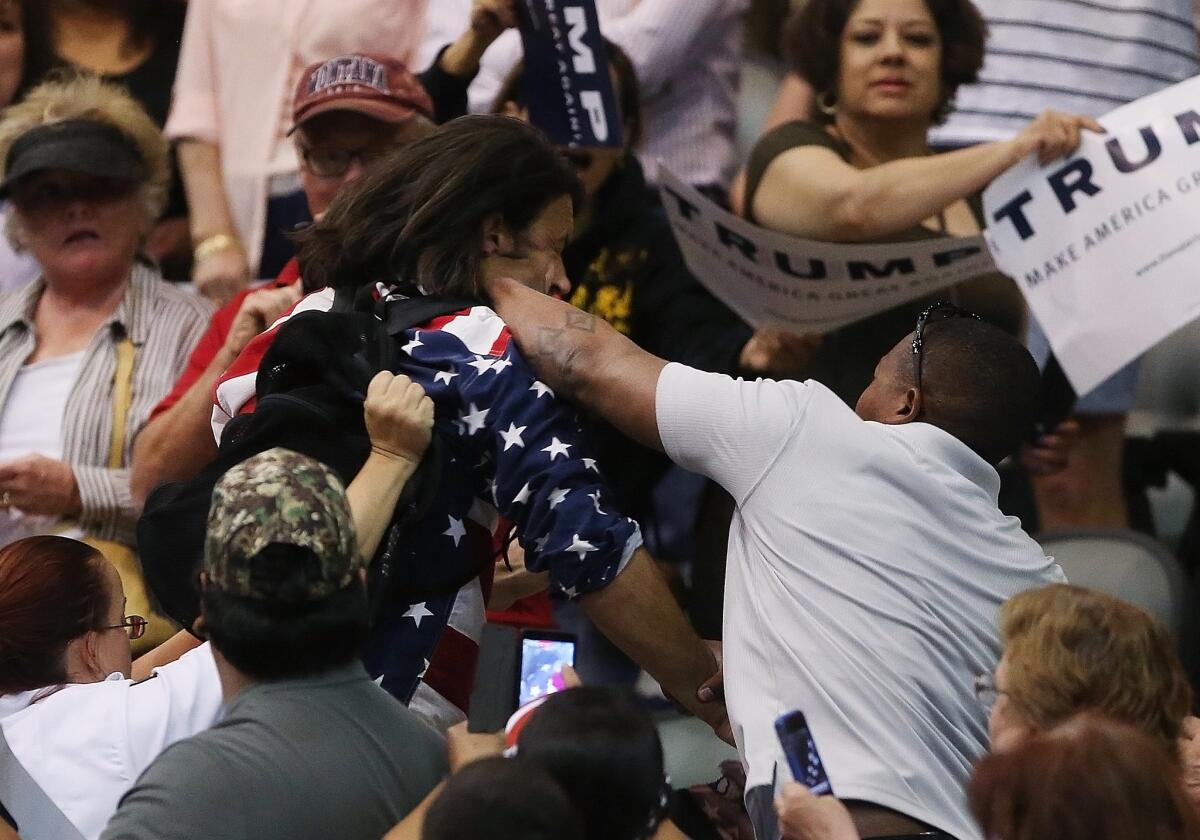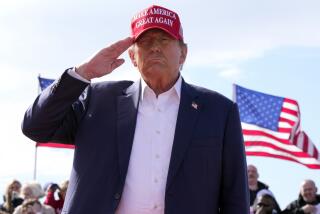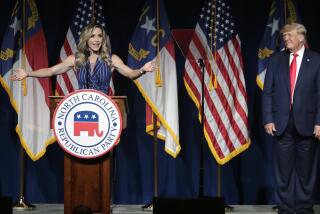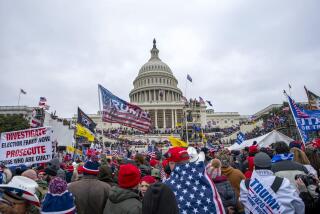This summer’s Republican convention protests will be fueled by a volatile mix of forces

Protester Bryan Sanders, center left, is punched by a supporter of Donald Trump as he is escorted out of Republican presidential candidate’s rally at the Tucson Arena on March 19.
This summer, parallel swarms of Republican supporters and left-wing activists will descend on downtown Cleveland for what could be the most turbulent presidential nominating convention since the 1960s.
Republican national conventions are often protested by activists in large numbers. But this year, the forces converging on the convention threaten to make for an explosive mix: a city scarred by controversial police shootings and simmering with racial tension; a candidate who has threatened that his supporters will riot if he comes with the most delegates but leaves without the nomination; and a police force with a reputation for brutality.
“I’m really concerned all hell is going to break loose,” said James L. Hardiman, a vice president of the Cleveland NAACP, who noted community members are expressing concerns about the convention “every other day.” “The big concern is injury to people, damage to property, indiscriminate arrest. The people who actually live here – what are we going to be left with at the end of the day?”
Donald Trump’s campaign rallies have become magnets for violence not normally seen at such events. Some protesters have gotten punched and kicked by Trump supporters, and others have fought with Trump supporters outside rallies.
This month, black, Muslim and Latino activist groups helped shut down a Trump rally in Chicago. More audacious and often risky protests followed. Over the weekend in Arizona, demonstrators blocked a road leading to a Trump rally, and another protester was punched while being ejected from a Trump event.
It’s unclear whether any left-leaning activists will be able to breach security to protest inside the Republican National Convention, but Trump has said his supporters might riot in Cleveland if establishment Republicans persuade GOP delegates to nominate a different candidate.
But protesters may be even more worried about the people tasked with controlling the crowd. Much of the security outside the convention, which will include police from multiple agencies, will fall under the authority of the Cleveland Police Department, which has come under federal scrutiny for its repeated use of “unreasonable and unnecessary force,” in the words of a 2014 Justice Department investigation.
In one incident on Nov. 29, 2012, Cleveland police officers fired 137 shots at the car of an unarmed black couple, Timothy Russell and Malissa Williams, killing them. More than 100 officers had set off after the couple in a high-speed chase after their car backfired and police mistook the sound for gunshots.
SIGN UP for the free Essential Politics newsletter >>
Demonstrators took to the streets in May 2015 when a judge acquitted Officer Michael Brelo, who was charged with manslaughter for jumping onto the hood of the car and firing 15 shots through the windshield at Russell and Williams. The ACLU later sued when Cleveland police trapped dozens of protesters in an alleyway and arrested them on suspicion of failing to disperse – though a dispersal order was not given loudly and there was no way to leave. The city settled the lawsuit, agreeing to implement clearer crowd dispersal and mass arrest policies, which are likely to be put to the test at the convention.
Cleveland civil liberties advocates are also concerned about the $50-million federal grant given to the city for convention security. The city has requested bids to purchase 2,000 sets of police riot gear, plus several sets of ballistic protection gear, steel barriers and improvements to its surveillance systems.
“We’re worried about the militarization of the Cleveland Police Department,” said Freda Levenson, the legal director of the ACLU’s Ohio chapter.
“The consent decree is based on a history in which our Police Department has shown an inability to police with conventional police equipment in ordinary day-to-day situations, and now they’re going to be given all this new shiny technology and weapons,” Levenson said. “We’re concerned about their training and their ability to use this [equipment], especially in this larger and challenging context.”
Cleveland Mayor Frank Jackson – a Democrat who pushed for the convention to be held in Cleveland – declined to comment on security measures being taken. “As a community, however, we look forward to showcasing our great city and to providing a safe environment for all those who live, work and are visiting our city,” the mayor’s office said in a statement Friday.
Left-wing activists have been preparing for the convention since it was announced in July 2014. On Saturday, dozens of attorneys, civil liberties advocates and potential protesters from across the Midwest came to Cleveland for a conference hosted by the National Lawyers Guild. Black Lives Matter activists, communists and Catholic workers were all in attendance, and on the lookout for spies.
Signs plastered across the Case Western Reserve University School of Law warned attendees that Republican National Convention committee staff, city officials, undercover police and informants might be afoot at the public sessions. The secret counterintelligence program known as COINTELPRO was referenced more than once as a cautionary tale.
“Is anybody here from the RNC committee?” a Michigan attorney, Julie H. Hurwitz, called out to a room full of listeners in the law school’s mock-trial room, where she was discussing how to defend activists in mass arrest cases. The crowd laughed nervously. “Fine, don’t raise your hands.”
Walter S. Nicholas, 91, introduced himself at the gathering as a World War II veteran who hoped to use his writing to shape public opinion and send the message that “activism is not terrorism.”
David Witt, a former Ferguson, Mo., resident and activist for Copwatch, which films police officers, was visiting the conference from St. Louis. “I know a few people who want to be active in this RNC thing that’s coming up,” he said, and he mentioned that he might help with filming.
Some already had plans set. Larry Bresler, director of the activist group Organize! Ohio, said an anti-poverty demonstration is planned for July 18, the first day of the convention – and the 50th anniversary of the start of race riots in Cleveland’s Hough neighborhood.
“There’s a complete ignoring of the problems of poverty and the structural issues of poverty” in presidential elections, said Bresler, who also protested the Republican National Conventions in 2004 and 2008.
Cleveland resident Alana Belle said she was a relative newcomer to activism; she got involved with protesting locally only after a grand jury decided in December not to indict the officer who shot Tamir Rice.
She said she was still figuring out what kind of role she wanted to have for the convention, though she was inspired when she saw activists break up a Trump rally in Chicago on March 11. “I was excited. I was jumping for joy. I thought it was beautiful,” she said. “They did the damn thing.
“I’m hoping to learn a lot from them, to sort of bring that energy, those strategizing skills, that sort of fun stuff to Cleveland,” Belle said.
MORE FROM POLITICS
What do residents of Trump’s ancestral village in Germany think of him? Not so nice
Lena Dunham, America Ferrera: We’re female millennials, and we choose Hillary Clinton
Andrew Breitbart warned conservatives about Trump, but he never saw this coming
More to Read
Start your day right
Sign up for Essential California for news, features and recommendations from the L.A. Times and beyond in your inbox six days a week.
You may occasionally receive promotional content from the Los Angeles Times.







